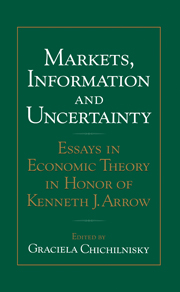Book contents
- Frontmatter
- Contents
- Preface
- List of contributors
- Section I Information and markets
- Section II Uncertainty and finance
- 3 The formulation of uncertainty: Prices and states
- 4 A remark on incomplete market equilibrium
- 5 Existence and optimality of a general equilibrium with endogenous uncertainty
- 6 Market equilibrium with endogenous price uncertainty and options
- 7 Catastrophe futures: Financial markets for unknown risks
- Section III Market externalities and justice
- Author index
- Subject index
5 - Existence and optimality of a general equilibrium with endogenous uncertainty
Published online by Cambridge University Press: 05 December 2011
- Frontmatter
- Contents
- Preface
- List of contributors
- Section I Information and markets
- Section II Uncertainty and finance
- 3 The formulation of uncertainty: Prices and states
- 4 A remark on incomplete market equilibrium
- 5 Existence and optimality of a general equilibrium with endogenous uncertainty
- 6 Market equilibrium with endogenous price uncertainty and options
- 7 Catastrophe futures: Financial markets for unknown risks
- Section III Market externalities and justice
- Author index
- Subject index
Summary
Introduction
Kenneth Arrow once said that uncertainty about prices may be the most important form of economic uncertainty. Yet the treatment of uncertainty in Arrow–Debreu markets reflects only nature's moves. It therefore neglects price uncertainty, because prices depend on human behavior.
This chapter attempts to close the gap. It defines a new concept of general equilibrium in markets where traders are uncertain about prices, and proves the existence of such an equilibrium. Traders do not know the possible equilibrium prices a priori. The state space which represents price uncertainty, and the financial instruments used to hedge this uncertainty, are all defined endogenously as part of a market equilibrium.
To motivate the problem, I show in Proposition 1 that trying to hedge price uncertainty within an Arrow–Debreu framework leads to paradoxical outcomes, which are connected with Russell's paradox in logics. Thus a new framework is needed.
The framework introduced here is similar to that of Arrow and Debreu in that there are several markets, several traders who act competitively, and all contracts are entered simultaneously. However, the treatment of uncertainty is different. It is given by “layers” of uncertainty, where each layer is logically conditional on the previous one. Each layer is a formalization of index-based securities markets which are widely traded today. They provide a conceptual explanation of the role of derivative securities and of their market organization.
- Type
- Chapter
- Information
- Markets, Information and UncertaintyEssays in Economic Theory in Honor of Kenneth J. Arrow, pp. 72 - 96Publisher: Cambridge University PressPrint publication year: 1999
- 2
- Cited by

